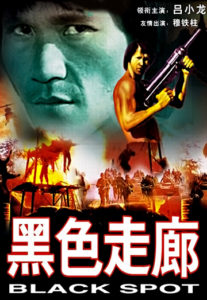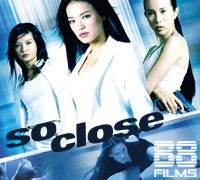AKA: Earth & Fire
Director: Bruce Le
Cast: Bruce Le (Huang Kin Long), Lo Lieh, Kong Do, James Ha Chim Si, Ho Pak Kwong, Cheng Yuen Man, Wong Hap, Andre Koob, Elizabeth Gordon
Running Time: 98 min.
By Paul Bramhall
Bruce Le has always been the Bruce Lee clone that can. From starting off as a Shaw Brothers bit player in the 70’s, his resemblance to the departed megastar saw him spend the latter part of the decade thrust into starring roles of such low budget Bruceploitation efforts as Enter the Game of Death and Bruce and Shaolin Kung Fu. Often shot in the Philippines and Korea, due to the cheaper locations and crews, Le’s output seemed destined to have history view him as the weakest of the Bruce Lee clones. However the guy persisted, and during the 80’s took greater control over his career, starring in such globe-trotting adventures as Challenge of the Tiger and Bruce Strikes Back, as well as getting in on more grand scale Filipino action movies, such as Mission Terminate alongside Richard Norton.
By the time it was the 1990’s, Le had also established himself as a director, and to kick off the decade made both Ghost of the Fox, a Chinese Ghost Story inspired tale of the supernatural, and Black Spot, the movie that delivers Le’s final action performance in front of the camera. In many ways Black Spot can be considered the swansong for the original wave of Bruce Lee imitators. Bruce Li had retired from filmmaking in the early 80’s, and by 1990 Dragon Lee had long since returned to Korea and moved away from the period kung fu movies he was known for. While Le had also long stopped aping the mannerisms of Bruce Lee by the time Black Spot was released, the story, wardrobe, and just about everything else still safely mark it as the Bruceploitation genre.
Le’s last effort as an ass kicking kung fu man owes much to his 80’s collaborations with B-movie maestro Dick Randall and Filipino director Joseph Velasco (who’s also on-board here as producer). The globe-trotting element is still firmly in place, as Le plays a former drug kingpin trying to lead a quiet life, but is ultimately dragged back into the game by the police. They’re determined to find the location of The Golden Triangle, the source village where all the opium is coming from, and they know they can leverage Le’s connections to get close. The results see Le travel from France, to the likes of Hong Kong, Taiwan, Mainland China, and finally Thailand.
It’s understandable that Le doesn’t want to leave his peaceful life in France, as he seems to be running a kind of health retreat, which has leotard wearing blondes perform somersaults in front of the camera, while others bathe topless on the veranda. However when he’s reminded of how many lives his former activities ruined, he feels morally obligated to get involved, he is Bruce Le after all. It has to be said that despite there being no mistaking that Black Spot is a Bruce Le movie, it’s a world away from the productions he was making only 10 years prior. While it doesn’t consist of non-stop action scenes, the story actually holds up as an engaging tale of the drug trade and those it involves. Black Spot also sports a script that clearly wasn’t made up on the fly, as the story spans a number of months, with the date regularly appearing onscreen to provide a timeframe of the events that are unfolding. Never mind that one of the dates is 30th February.
There’s also plenty of familiar faces in Black Spot to keep the HK film aficionado happy, with cameo appearances from the likes of Lo Lieh and Kong Do, both of whom play drug kingpins that Le used to be associated with. While Le fights both of them, the highlight fight belongs to when he has to square off against a massive monster of a man, who must be about 7 foot tall and just as wide. The fight takes place within a cage covered in barbed wire, and when one fighter decides against stepping into the cage, instead a completely random sheep is thrown in. Before you have a chance to contemplate where the sheep came from, the man mountains lifts it above his head by the legs, partially rips it in half, and lets its insides and blood pour all over his face, which he eagerly laps up. It’s a disturbing scene which I hope wasn’t real, or at least it wasn’t alive at the time, however what’s just as disturbing is that Le barely comes up to the guys chest in height, making for a genuinely tense showdown that ends on a suitably gory note.
There are other factors that make Black Spot an interesting footnote in the Bruceploitation genre, one particular being that Le was 40 at the time he made it, which makes him a full 8 years older than when Bruce Lee died at the age of 32. At this point Le had spent 14 years under a name created to cash-in on the death of kung fu’s most successful star, starting with Bruce’s Deadly Fingers in 1976, so there’s certainly some irony in just how long his career lasted compared to the man who he wouldn’t exist without. Le himself has acknowledged this, however the hard graft he put into those low budget 70’s productions arguably paid off in the long run, as Black Spot comes with a surprisingly high budget.
This is no more evident than in the final 20 minutes, when Le has infiltrated the small rural Thai village that’s the source of the opium, and discovered that the drug is being purified and distributed via an underground lab built in a cave beneath the village. If you ever wanted to see a finale that can be summarised as Rambo meets Enter the Dragon, then you’ve come to the right place. Apparently Le was able to enlist the cooperation of the Thai army for the finale, and as a result, it contains a significant number of extras, a military helicopter, 4 tanks, and more machine guns than you can shake a stick at. The scale is truly impressive, as the village is decimated with explosions, and Le takes to running through the cave, armed with a machine gun of which his finger barely comes off the trigger. Bullets, punches, and kicks are liberally thrown, as Le and his entourage shoot seven shades out of anything that moves (and stuff that doesn’t).
I’d gotten so used to the Bruceploitation genre being derivative of other more popular HK movies, that I couldn’t help but admire how the movie was successfully able to copy the grand scale of the action found in the likes of Bullet in the Head, until I realised it was released the same year. Likewise the village where the showdown takes place looks remarkably similar to the one from Police Story 3: Super Cop, and again it wasn’t until I stopped and thought about it, that it hit me Chan’s movie didn’t come out until 2 years later. In that respect Black Spot can be considered to be Le’s true epic, which is a line that even I confess to never imagining I’d write. Le has stated that the production took 3 years to complete in total, which may explain why his last movie prior to this was the Fist of Fury inspired 1987 production, Ninja Over the Great Wall, and for the most part the effort shows. Le even broke a leg during the production while performing a stunt, and reportedly directed the remainder of the movie on crutches.
However as ridiculous as it may sound, it wasn’t the action that left a lingering impression after the credits rolled. Le clearly wanted to convey a message on how the drug trade profits off the poverty of those in places like the rural village growing the opium, and in the movie he befriends a family that make their money from growing it. He realises that the family have no idea how much harm the drug is doing overseas, they simply grow it as a means of supporting their children and elders. Perhaps it was due to Le’s own upbringing in Burma that he felt a close connection to such a story.
At the end, when the army gathers all the opium and plans to set it on fire, the villagers beg them not to destroy their livelihood, which is met with dire consequences. While witnessing this, Le is sent over the edge, culminating in a surprisingly powerful final scene of a man powerless to stop the death of innocents, even though seemingly all of the bad guys have been wiped out. A Bruceploitaion flick with a finale that delivers a surprisingly emotive punch? Who would have thought, but Black Spot does indeed to exactly that.
Paul Bramhall’s Rating: 7.5/10





Of all the BL clones, Le is my least favorite, but this sounds intriguing. I’d be down to watch this.
Of all the clones, Dragon Lee/Bruce Le are equally my least favorites – not anything against them; more so their movies (at least from I’ve seen) themselves. This Black Spot film does look pretty good judging from the clips I’ve seen. The action is pretty tight. My favorite Dragon Lee film is Enter Three Dragons. And Enter the Game of Death is my favorite Le film – how can you not like a Game of Death-clone with shades of Fist of Fury and Enter the Dragon. 🙂
If I may ask…where is this film available to watch? I actually do like Bruce Le and had never heard of this one until now.
It’s currently available on YouTube on the Wu Tang Collection under the title ‘Vicious Passageway’ (here’s the link). It looks to be a remastered print taken from Chinese TV in 2018, however doesn’t feature English subtitles and appears to have a lot of the violence removed (the sheep decapitation scene is completely gone).